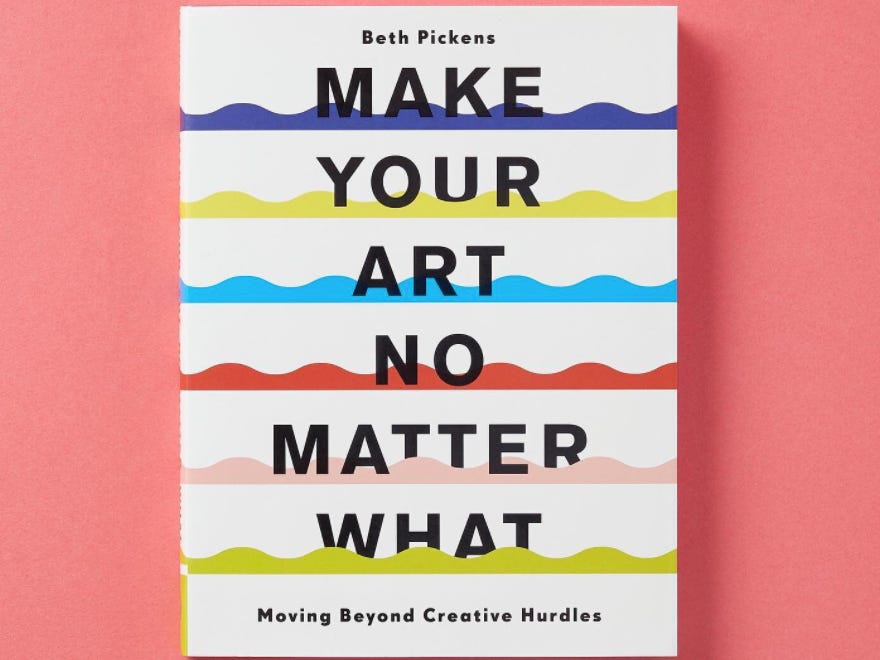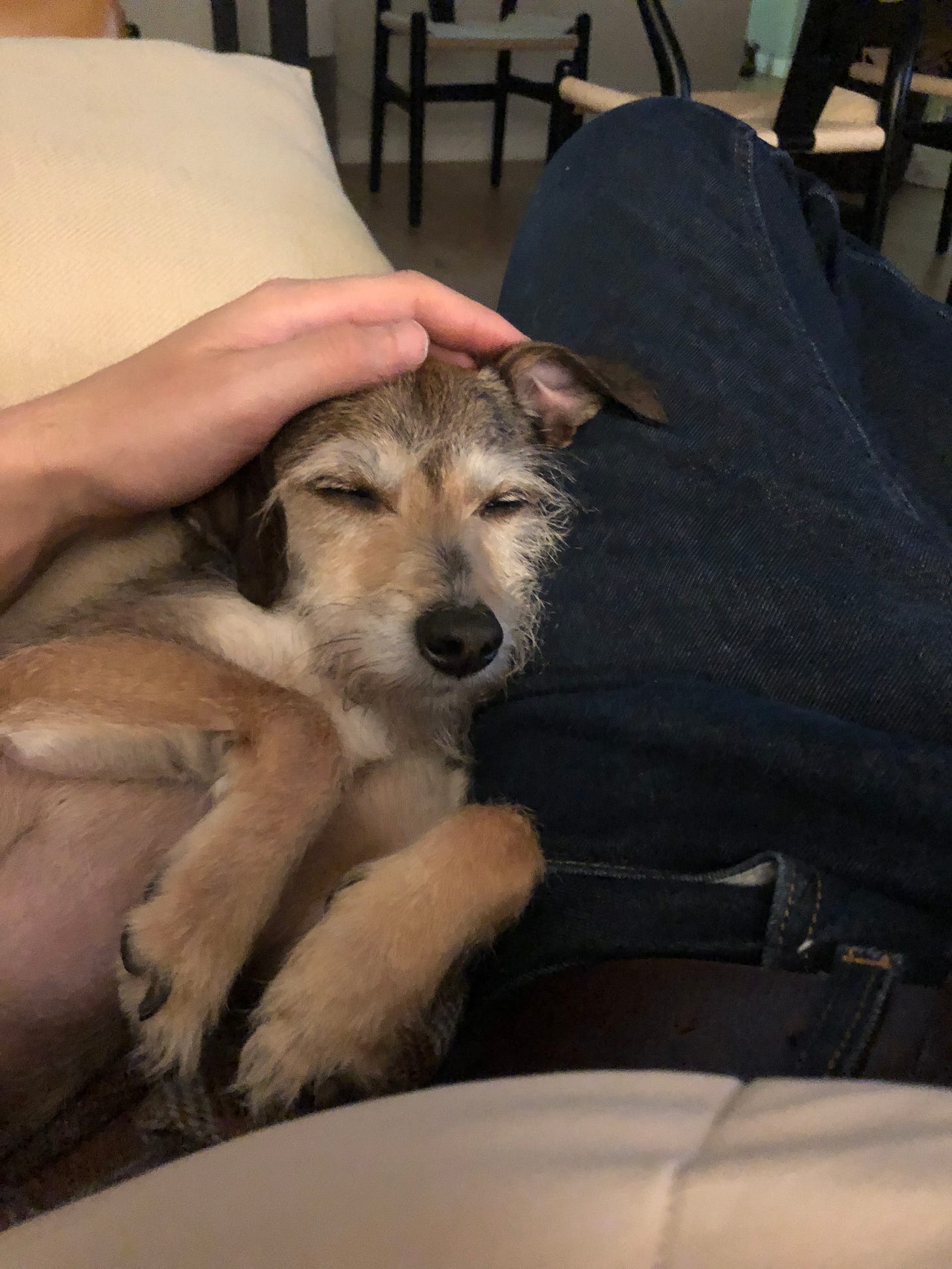77. 🔗 parts work 🔗
thinking about my whole self
Hello, and happy Monday.
I hope that you all are having a wonderful long weekend and that this is coming into your inbox on a day when you’re not checking it. 😎 I can’t believe we’re halfway into the month already. Luckily, the semester still hasn’t started yet, as I’m still trying to finalize the things on my syllabus and get ready for the first day of class. While I’m prepping my course, I’m also trying to get as much work done on my own writing projects as I can. Needless to say, this month has flown by in a haze!
I hope that you’re doing well. And if you’re in a cold climate, I hope you are staying warm out there! This past weekend was so chilly!! ☃️ I hope you just spent it inside reading a backlog of newsletter issues over many cups of tea! 🫖
✏️ Still processing.
One of the things I did over the winter break was clear out my downloads folder. Just as my coffee table holds all the physical clutter in my life, my downloads folder holds all my digital clutter. I really had to take a day to sit down, go through each file, and figure out where its new home would be.
One of the files that I found was this Procrastinator’s Guide to Writing from the Center for Academic and Personal Development at Harvard. I couldn’t tell you how I stumbled upon this page in the internet wild, but there it was just sitting in my folder. The document lists 12 common “limiting beliefs” people have when writing, “alternative assumptions” we can use to try to combat those limiting beliefs, and exercises that may be helpful in moving forward with our writing. Although the likely audience for this document is undergrads (maybe grad students too), I think that there are a lot of wonderful insights that could help writers at any stage or in any context.
Seeing as I was having trouble getting into my writing last week, I decided to take Monday morning to read this 15 page document and see if anything would help me reframe my writing and the writing process for the new year. One in particular stuck out to me, because of what I wrote last week about my inner child, and what I’ve written before about switching from “I” to “you” in my process journal. It was about the antidote to limiting belief #6: “Stuckness is bad. If I’m stuck, I’m doomed.” This is what the author, Sheila M. Reindi, had to say about combatting our negative feelings towards “stuckness”:
Negotiate with yourself. To work and play with less internal conflict, you need to form alliances among various parts of yourself—for example, among the part of you that aspires to do your best; the part that values other things in life besides achievement; and the part that is afraid of failure, compulsive working, loneliness, or other potential risks of engaging with your work. To form such an alliance requires that all of the separate, uncooperative, “me/I” voices join to create a generative “we/let’s” voice...In creating a “we/let’s” voice, you bring together all of your energies in the effort to live a life that feels whole and true to the complexity of who you are.
I’ve heard of parts work before, but I don’t think that I ever thought about how it could factor into the way that we work through our writing process. When reading this paragraph, though, something clicked for me. I thought back to the way that I cognitively tried to distance myself from my writing by asking questions that featured “you” (rather than “me”) in my process journal. I also thought back to what I had just written last weekend, about how my inner child was keeping me from my work because she wanted to make sure that there would still be fun in our days. In reflecting on those thoughts, I realized that this re-frame to think of my writing self as a “we”—as a person full of parts that may desire different things—I am acknowledging that I must bring my whole self to the page.
I’ve tried to honor this “whole self” in my journal by rephrasing the questions that I ask myself as I prepare for each writing session: “How are we feeling about our writing?” “What are we bringing to the page today?” “What do we need to do to enjoy this process?” I am able to recognize that my feelings about things in my personal life come to inform the way that I interact with my work life, for instance.
📚 Still reading.
hooks, bell. Teaching to Transgress: Education as the Practice of Freedom. New York, Routledge, 1994.
I first came to bell hooks in graduate school through her essay “eating the other,” but I only just learned of Teaching to Transgress through Stephan’s newsletter issue that had a tribute to the author. I had no idea that hooks wrote three texts on teaching and pedagogy, so I immediately purchased all of them to read as soon as I could. This week, I decided to read the oldest text, Teaching to Transgress. (Next week, I want to talk about Teaching Community, so watch out for that! 👀)
What can I say but that this is one of those “life changing” books. This one features a set of essays that hooks wrote right after she had finished teaching in elite private schools and was going to start at City College in New York. The essays are written from her perspective as once being a working class student of color at an elite university as well as then becoming a teacher at predominately white institutions. While the book was written in 1994, so many of her points continue to resonate with today’s world as a site where we continue to contend with racism, sexism and other types of oppression embedded within the way that we produce knowledge and communicate it to our students.
After reading Teaching to Transgress, I see it as such an important text for students and teachers alike because it lays out the stakes of engaged pedagogy—the classroom community that fosters its members to think critically and talk about knowledge with the goal of collective liberation from these systems of oppression. So much of hook’s writing lays out the stakes of engaged pedagogy—what it is, what it does, and how we can make moves to get there.
While each chapter brought out such valuable insights, I wanted to highlight a few here that were particularly critical to my own thinking as I move into teaching this semester:
“Engaged Pedagogy”: While most of this essay lays out the meaning and stakes of engaged pedagogy, the idea that resonated most with me was that I should also bring my whole self to the classroom. In my own pedagogical practices (and even my teaching statement) I talk about how important it is for students to bring their “whole selves” to the classroom. That is to say, students should interrogate how the issues and themes we discuss in class connect to their lives as people in the world who hold distinct identities, who are a part of different communities, who are affected by the world. So far, I have understood my role as a teacher to blend into the background in a sense—to stand back as students work through these questions, providing guidance when necessary. But hooks sees it another way: “Engaged pedagogy does not seek simply to empower students. Any classroom that employs a holistic model of learning will also be a place where teachers grow, and are empowered by the process. That empowerment cannot happen if we refuse to be vulnerable while encouraging students to take risks,” (21). This essay is encouraging me to lean into vulnerability this term.
“Paulo Freire”: So much of this newsletter is about the practice of consenting to learn in public, which means that I might get things wrong sometimes, and I certainly will have blindspots that others could (and should) point out to help me grow in my scholarly practice. This essay is structured as a dialogue between hooks as “bell hooks,” her “writing voice” and “Gloria Watkins,” herself as a person talking about the influence of Paulo Freire (author of Pedagogy of the Oppressed) on her teaching practice. Despite Freire’s sexism in his early work, hooks still found value in the work—that it “affirmed [her] right as a subject in resistance to define [her] reality,” (53). What is more, when hooks confronted Freire with the fact that his work harbored sexist beliefs, he engaged her critiques with sincerity and vulnerability. This, for her, was a moment in which he had done precisely what his books call for—a mutual growth through common effort—despite it illuminating his own blindspots.
“Theory as Liberatory Practice”: I am not one of those people who can read theory once and just get it. This essay critiques the inaccessibility of most academic theory, arguing instead for theory as a healing practice that is embedded in lived experience. “When our lived experience of theorizing is fundamentally linked to processes of self-recovery, of collective liberation, no gap exists between theory and practice. Indeed, what such experience makes more evident is the bond between the two—that ultimately reciprocal process wherein one enables the other,” (61). And then there’s the aspect of what a healing theory may bring: “For in its production lies the hope of our liberation, in its production lies the possibility of naming all our pain—of making all our hurt go away,” (75).
“Building a Teaching Community”: This essay is a dialogue between hooks and Ron Scapp, “a white male philosopher, comrade, and friend,” (131). The dialogue itself touches on many important aspects of teaching, such as the identity & embodiment of “teacher,” the structures of power in a classroom, employing a pedagogy of liberation in the classroom & the critiques that may initially show up from students themselves, and seriousness and pleasure in the classroom. It was such a fantastic dialogue—I highly recommend reading this chapter if you only have time to read one essay from the collection.
🌀 Still consuming.
In the bookshop:
Currently Reading: Wow, No Thank You by Samantha Irby
On Deck: The Death of Vivek Oji by Akwaeke Emezi
Like so many I know, I am OBSESSED with wordle. That there’s only one game a day is very good for my productivity, as I would probably be playing for HOURS otherwise. (Also the story behind it is so sweet!)
Brandon Taylor’s thoughts on wordle & much more.
There is now a LITERAL CLOUD ATLAS.
📖 Book club corner.
For January’s book club, we will be reading Make Your Art No Matter What by Beth Pickens! Thank you to everyone who voted, and feel free to purchase a copy of the book here! Details are below.
Here’s the event info:
Date & Time: Tuesday, January 25 @ 5PM PST/8PM EST
Registration Link!
Suggested Donation (for those able to donate): $3-10 through Paypal or Venmo (@idyalz)
🐶 A pup-date.
I think Girlie looks so cute when she’s sleepy:
As always, thanks so much for reading through, and I'll see you in the next one!
Warmly,
Ida






